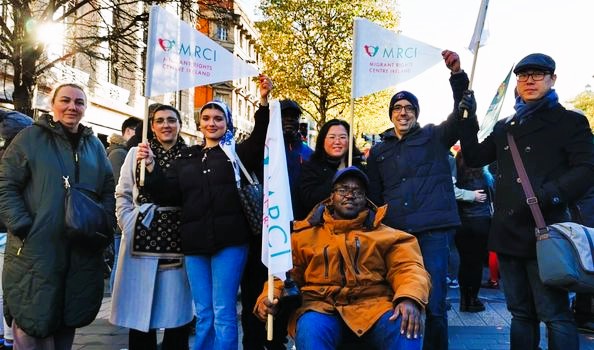The Migrant Rights Centre Ireland, which works to advance the rights of migrant workers and their families at risk of exploitation, social exclusion and discrimination, had another busy year according to new figures for 2023.
The non-governmental organisation has strong Columban links. Fr Bobby Gilmore is a founding member of MRCI and a long-standing board member, while Michael O’Sullivan, Co-ordinator of Development Education with the Columbans, is Secretary of MRCI’s Board.
The non-governmental organisation dealt with 3,711 cases and 3,291 people last year from 123 countries. The nationalities most frequently seen were: Brazilian, Filipino, Pakistani, Chinese, Mauritian, Nigerian, Indian, Irish, Ukrainian, South African, Bolivian, Bangladeshi, Malaysian Mexican, Malawian and Bostwanan.
According to a spokesperson for MRCI, “We opened 3,711 cases and 2,343 closed, 86 nationalities, 6,658 activity supports through emails, phone calls, face to face or zoom meeting. Responses mainly related to the Regularisation scheme, trafficking for labour exploitation, family reunification, reactivation employment permit, employment issues and housing, change of status and other general immigration issues.”
“We conducted 688 appointments (via zoom/call and face to face), 428 advocacy appointments. We recorded 1,935 successful outcomes by ensuring people got the appropriate information, assistance in writing letter to different departments, submitting trafficking for labour exploitation case, regularisation appeals, securing Reactivation permit, leave to remain and change of status application, GNID/IRP card registration ISD, getting PPSN and accommodation for homeless, attending WRC, assessing employment issues and assisting to WRC to make complaints.”
Grounded in social justice, anti-racism and equality, MRCI’s mission is to empower migrant workers in low paid and precarious work to secure and advance their rights through collective action.
Since its foundation in 2001, MRCI has sought to promote the right and to highlight the experiences of migrant workers who are undocumented, or at risk of becoming undocumented and those vulnerable to exploitation, including extreme forms such as forced labour and trafficking for forced labour.
MRCI assists workers in the domestic, agricultural, restaurant, seafaring and construction sectors who have experienced forced labour.
Forced labour begins with deception about working and living conditions, followed by low or no pay. Deception, coercion and abuse are also used to control workers. The process can also be gradual: working conditions may be initially decent but deteriorate over time.
In the experience of MRCI most undocumented migrant workers will not access medical services due to the fear of becoming visible. Many undocumented migrants ignore minor illnesses and only attend hospital following accidents or emergencies.
The coping mechanisms used by other migrant workers are not as available for this group, for example they cannot travel home to seek medical attention as without a valid permission to remain they are not able to move freely. This drives migrant workers to seek alternatives and in some cases use uncertified medical practitioners. Self-medication is also common place
Immigration status also plays a key part in accessing pre and post natal care. Many women after they give birth report that they do not consistently return for medical checkups, impacting in the long term on their gynaecological and reproductive health. This has clear implications for the health of migrant women.
For more information see: https://www.mrci.ie/

